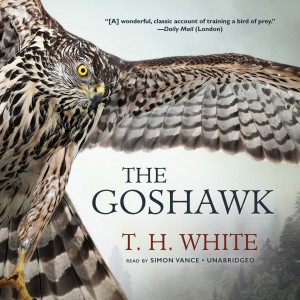
White, T. H. The Goshawk. 1951. Ashland, OR: Blackstone Audio, 2015. CD.
Genre: nonfiction/nature memoir
Summary: White chronicles his misadventures and many mishaps in an attempt to tame a goshawk. He knows only what he has learned from old books. Nonetheless, he is driven by his love of the medieval and ancient cultures who reserved the designation of “gentleman” for the men who mastered the mighty raptors. Using only kindness and persistence, White proceeds to deprive the bird of sleep for up to nine days. But whatever the bird endures, so too must the falconer, or ostringer. Man and bird wear each other down, but in their delirium, they might just learn to communicate, confess, and conspire as equals–or die trying!
Critique: White is best known for his Arthurian sequence, The Once and Future King. His finesse as a craftsman of lush worlds and compelling characters shines in this work of nonfiction. Structurally, White divvies the tale by days of the week, as if falconry was one of the most mundane weekly activities. Something you or I might pencil into our day runners or tap into our Google calendars. The result is a successful dismantling of the wall that might otherwise divide the modern reader from the ancient sport.
The accounts of man and bird are a mix of funny, insightful, tragic, and absurd. The willful, fierce, and stubborn hawk, lovingly named Gos, quickly intoxicates White. He alternately admires and pities the feral freedom embodied in this creature’s every behavior, expression, and gesture. But something tantalizingly vibrant and ultimately doomed lurks within the potential partnership between man and bird of prey.
On its surface, this text of reluctant animal/man friendship reads much like the classic boy/beast stories such as White Fang and Old Yeller. But, deep in its subaceous layers resides the ultimate writer’s craft book. Move over, Anne Lamott! White has a literal bird-by-bird approach that is just the theriac a writer needs to undertake the dangerous task that is writing.
Like falconry, writing bids us to tame a wild thing: the imagination! It is risky and you can bet on many sleepless nights, plenty of repeated failures, and some bloodshed. Sometimes, a partnership emerges and the writer yawps with success. Other times, the jesses break and the beast flaps away into the dark forest, leaving the writer crouched and weeping. Either way, the writer–like the falconer–must choose to respond with genteel kindness, compassion, and tenacity. Or else forever earn the impermeable hatred of the mythical creature uniquely capable of plucking out the stories hiding in the tall grasses.
Comments